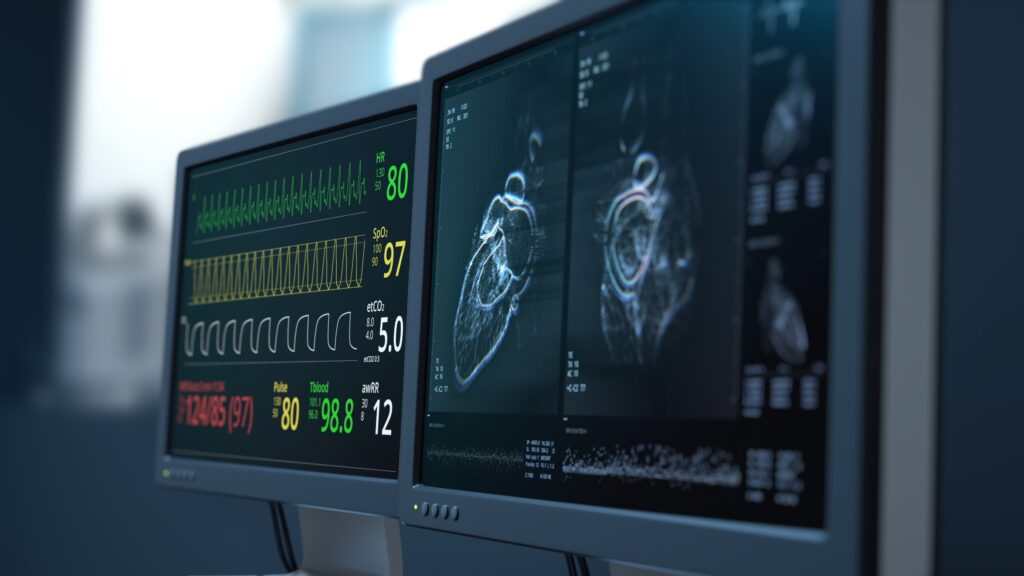A CT coronary angiogram is a type of investigative test that uses contrast dye and x-ray imaging to look at the coronary arteries. Using the dye, your doctor will look at how well blood is flowing through your coronary arteries and can identify possible issues or concerns with heart health. This can include things like blockages or plaque formation around the arteries that prevents blood from flowing as it should.
If your doctor has recommended a CT coronary angiogram, it is crucial to understand exactly what the procedure is and what it is used for. This will help you determine, with the advice of your doctor, whether one is necessary for you. This article will explore what CT coronary angiograms are in more detail, what diseases they can detect, and how to prepare for one.
What Is A CT Coronary Angiogram?
A CT coronary angiogram uses x-ray imaging to look at the arteries around the heart. The imaging is used in combination with iodine-containing dye, which is normally injected into the vein. This dye is harmless, though you may feel a hot flush, a metallic taste in your mouth or a feeling as if you’ve urinated. This is nothing to worry about, and the sensation will pass within a few minutes.
This allows your doctor to watch the flow of blood through the arteries to see if they are narrowed or blocked. It is a highly effective way to get a good overall picture of your heart and to see if you could benefit from treatment to improve your heart health. Another of the key benefits of a CT coronary angiogram is that it is non-invasive and requires no recovery time.
What Can A CT Coronary Angiogram Detect?
A CT coronary angiogram can help your doctor to see the heart arteries and the plaques that can develop inside them. Because plaque can build up in the arteries without any outward symptoms of heart disease being present, it is a critical diagnostic tool to help identify heart disease and put in place an effective treatment plan. It can also be used for people with existing heart conditions for early prevention of complications and to monitor the effectiveness of the treatment used.
CT Angiogram Vs Angiography: What Is The Difference?
Both CT angiograms and angiography are methods for detecting heart health conditions in the arteries. The primary difference is that a CT angiogram is non-invasive, while traditional angiograms use a catheter inserted in the groin or wrist and is done under local anaesthetic. CT angiograms do not require the use of a catheter to introduce the contrast dye to the bloodstream.
Typically, a CT angiogram is far preferable to a traditional angiogram because it requires little to no recovery time. This makes it much faster, easier and less painful than a traditional angiogram, and many doctors prefer to use a CT angiogram first as a result.
For more information, please read our article on what can a heart scan detect?
CT Coronary Angiogram Preparation
Preparation for a CT coronary angiogram is relatively simple. It is a good idea to wear comfortable clothes for the procedure, and you may be asked to change into a hospital gown before you undergo the CT angiogram. It is also recommended that you avoid anything that might get your heart rate up, such as drinking sugary or caffeinated drinks 12 hours before the CT angiogram is due to take place.
You should also avoid doing any physical activity or smoking on the day of the scan. It is also best to leave any metal accessories or jewellery, including pierced jewellery, at home. This is because metal can interfere with the CT imaging equipment.
How Is A CT Coronary Angiogram Performed?
When you enter the procedure room for your CT angiogram, you will usually be asked to change into a hospital gown and lie down on a CT scanning bed. You will be connected to a heart rate monitor, and a cannula will be inserted into your arm. The cannula will be used to inject the dye into your bloodstream, which will help the doctor to visualise your arteries. Once the dye is injected, you’ll be asked to sit still for around 15 minutes to keep your heart rate relaxed. In some cases, beta-blockers may be used to help reduce your heart rate so the CT angiogram can begin.
You will then be asked to lie on a CT bed and raise your arms above your head while imaging takes place. You will need to lie as still as possible during the imaging, and you may also be asked to hold your breath for short periods. This is because the imaging needs to be as clear as possible, and movement caused by breathing can make the images blur.
How Long Does A CT Coronary Angiogram Take?
The scan itself will take around 20 to 30 minutes, though you can expect to be in the imaging facility for between three and four hours. This takes into account the different measures that may need to be taken to get your heart rate down to an appropriate level for the CT angiogram and the time taken to prepare you for the CT angiogram itself.
Is A CT Angiogram Safe?
CT coronary angiograms are typically considered to be a safe and effective way to diagnose or monitor heart health conditions. With any medical procedure, there is a risk of complications, and though these complications are rare with a CT angiogram, it is still important to be aware of what they are. Risks include:
- Allergic reaction to the contrast dye which may result in itching, redness, nausea and hives.
- A slight increase in the risk of cancer due to exposure to radiation during imaging.
- Worsening kidney function in those with pre-existing kidney issues.
How Accurate Is A CT Coronary Angiogram?
CT angiograms are highly effective and accurate when detecting coronary heart disease. It is the gold standard used when detecting heart disease as it is the best for imaging the soft plaque that can lead to heart attacks. The fact that they are non-invasive often makes them a much better option for patients, particularly for ruling out coronary artery disease in those with a medium or low risk of the disease.
Where Can I Get A CT Coronary Angiogram?
CT coronary angiograms are typically performed in hospitals in the radiology department. You should consult your GP on whether you need a CT angiogram and where the best place to go to get one would be. Here at Echelon Health, we offer the service as a standalone service or as part of our health assessment packages.
Heart Scans At Echelon Health
When it comes to your heart health, it is crucial not to take chances. Early detection is vital for preventing serious heart health issues down the line and avoiding complications. While some heart conditions may present with symptoms, not all do. Diagnostic tests like a CT coronary angiogram are critical to help you get the best information to help you manage your heart health effectively.
Here at Echelon Health, we have a Healthy Heart assessment which is dedicated to investigating your heart with the following tests:
These tests help detect various heart diseases including coronary heart disease, atheroma, and more. When it comes to our Healthy Heart assessment, we provide the gold standard. Nothing in the assessment is based on statistical risk analysis; the tests look inside the individual and provides them with personal insight into their own body.
If you have any questions don’t hesitate to contact our team or check out our brochure for more information on all the health assessments offered by Echelon Health.
Let us help you protect your most valuable asset.
Sources:
https://www.bhf.org.uk/informationsupport/tests/angiogram
https://www.mayoclinic.org/tests-procedures/ct-coronary-angiogram/about/pac-20385117
https://www.svhhearthealth.com.au/procedures/imaging/ct-coronary-angiogram
https://www.hey.nhs.uk/patient-leaflet/cardiac-ct-scan-ct-coronary-angiography/
https://www.radiologyinfo.org/en/info/angiocoroct
https://www.insideradiology.com.au/ctca/



